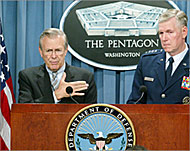CIA uncertain over Iraq’s WMD
A retired intelligence analyst has said that US intelligence agencies lacked solid information about Iraq’s alleged weapons of mass destruction in the run-up to the war.

Richard Kerr, a former CIA intelligence analyst said the Bush adminstration officials exerted presure on itelligence analysts to portray Iraq as threat.
Kerr is now leading a team of three other retired intelligence officers in a review of the performance of the Central Intelligence Agency (CIA) and other similar US agencies.
Kerr said intelligence agencies often lacked solid information on Iraq’s alleged weapons programme.
“There was, in some areas, a dearth of hard, detailed intelligence,” he said. “That presents a real problem for intelligence analysts.”
Kerr’s team has submitted an initial report to CIA Director George Tenet.
The United States has justified its war against Iraq on the basis Baghdad posed a “global threat” because of its alleged possession of nuclear, biological and chemical weapons.
But since US forces occupied Iraq in April it has not found any evidence backing its allegations.
Analysts pressured
 |
|
Rumsfeld proposed evaluation of |
Kerr said his initial findings indicate that the integrity of the intelligence process was maintained.
But he admitted that in the run-up to the war, intelligence analysts faced intense pressure from Bush administration officials seeking to portray Iraq as a threat.
Intelligence reports also note uncertainties and acknowledge gaps in US knowledge, said Kerr.
But many of those uncertainties never reached the American public’s ears, Kerr said in his report.
Statements by Bush administration officials rarely expressed doubts about Iraq’s alleged weapons programme.
Democrat Senator Evan Bayh, a member of the Senate Intelligence Committee, said that some uncertainties about Baghdad’s alleged weapons programme were glossed over in the run-up to the war.
A CIA spokesman declined to comment on Kerr’s report, saying it was part of a long-planned “lessons-learned” evaluation of the intelligence community’s pre-war performance.